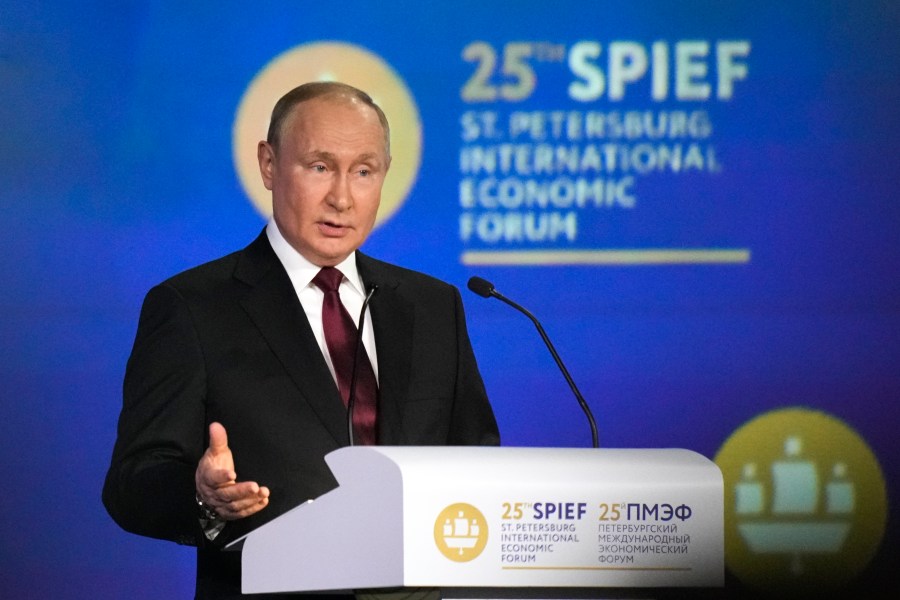“All our hope is in the famine,” RT editor-in-chief Margarita Simonyan recently explained, at the Saint Petersburg Economic Exchange. “The famine will start now, and they [the West] will lift the sanctions and be friends with us because they realize it is necessary.”
Although she is one of the Kremlin’s most reliable propagandists, Simonyan’s words cannot be dismissed as empty vindictiveness. She uttered these statements while sitting next to Russian President Vladimir Putin, who reportedly utilized his appearance at the forum to coordinate the messaging of Moscow’s most loyal information warriors.
As figures like Gary Kasparov have noted, Putin often lies about what he has done — but can display a surprising degree of candor about his future plans. Simonyan’s words confirm a long-suspected pattern: Putin intends to starve the developing world until he receives sanctions relief for his genocidal war of expansion in Ukraine.
In a tragic irony that parallels Russia’s ongoing devastation of primarily Russian-speaking Ukrainian regions, the Kremlin’s famine blackmail will primarily affect African and Middle Eastern regions most supportive or ambivalent to Russia’s war against Ukraine.
Given numerous, widespread Soviet famines, those who have studied — or lived through — the region’s history are least surprised by the “hell on earth” unleashed by Russia’s blockade of agricultural goods in Ukrainian ports. But Putin is also not the first Moscow dictator aiming to use hunger as a weapon. This history can clarify the problems Western policymakers face — as well as potential solutions.
In 1932, Joseph Stalin artificially engineered a devastating famine, the Holodomor (Ukrainian for “killing by hunger”) to punish successful Ukrainian rebellions against Soviet collectivization. Approximately 4 million Ukrainians perished in just over 18 months.
The Ukrainians pushing back tanks with their bare hands today have long understand the toll of their resistance, as Stalin succeeded in killing every eighth Ukrainian in their grandparents’ generation through this intentional genocide.
What should we learn from this history? First, Russia’s deliberate use of violence as a tool of control against civilians is linked to Ukrainian insistence that they cannot surrender or cede territory to Russia. Ukraine’s Foreign Minister Dmytro Kuleba articulated Ukraine’s position, saying even if the international community failed to “supply weapons, we’ll fight with spades. We’ll defend ourselves no matter what — because it’s a war for Ukraine’s existence.” These statements must be taken seriously from a nation that has declared its independence from Moscow five times over the twentieth century — and from a nation that has now shown it can inflict decisive victories and deep military punishments on the “second strongest army in the world.”
Second, Putin — like Stalin — has again resurrected the specter of genocide on the European continent, with shared concern raised by academics, legal experts, civil society, and politicians in Ukraine and abroad. Stalin’s victim toll may ultimately remain higher in Ukraine, but Putin flagrantly demonstrates his regime’s dangerous willingness to spread willful, starvation-driven violence to new continents. Putin’s genocide in Ukraine and fascism at home must cause international leaders to face the reality that without their direct intervention to transport Ukraine’s blockaded goods, 49 million people at-risk for famine will not be shown mercy by Vladimir Putin.
Yet historical comparisons also show good news: The Ukrainian state and people are no longer trapped behind Stalin’s iron curtain and have built a state that continues to function well under intense pressure. The European Union has awarded Ukraine EU candidacy status — a pathway to full membership. During the same week, the EU Ambassador to Ukraine praised Ukraine’s Parliament for three “groundbreaking” legislation packages on anti-corruption, protection of women and victims of domestic violence, and an EU-related framework for waste management. Since its democracy-oriented revolution in 2014, Ukraine has demonstrated that it can be a reliable and indispensable European military partner as the West faces turbulent decades on multiple continents ahead.
Finally, the Soviet Union’s near-perfection of international information blockades is no match for the modern information age. Bipartisan American support for Ukraine continues to shatter expectations, as the truth of Ukraine’s fight for their families and freedoms resonate with our own national story. In fact, the story of the Holodomor might have been lost forever, until Ukrainian and Jewish Americans staged an 18,000 person-strong picket in front of the Soviet embassy in Washington, D.C.
Putin shouldn’t get away with his crimes — or be able to replicate Stalin’s. Western democracies need to step up now to fully support Ukraine’s independence, end Putin’s blockade and prevent a modern Holodomor on an international scale.
A Ukraine-Russia specialist, Kristina Hook is Assistant Professor of Conflict Management at Kennesaw State University’s School of Conflict Management, Peacebuilding, and Development and a former Fulbright scholar to Ukraine.
